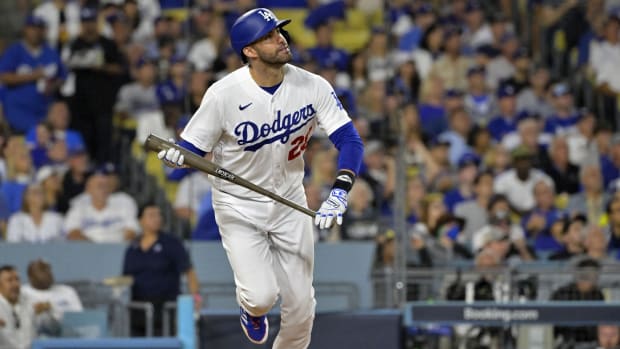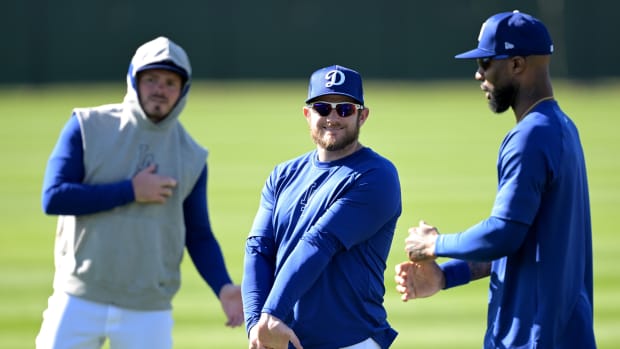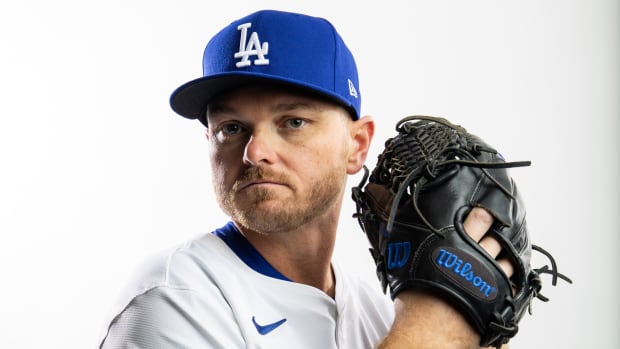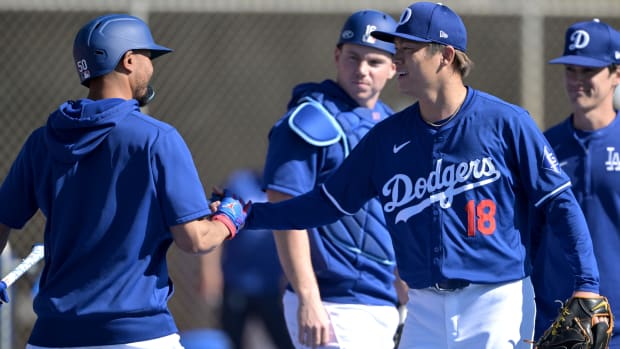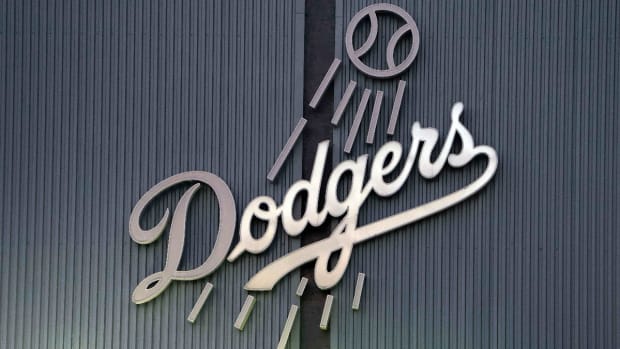MLB: Schedules and Open Camps Can't Overshadow Ongoing COVID-19 Concerns
Major League Baseball continued its precarious march toward the abbreviated 2020 season this week, but neither the unveiling of the abbreviated and unbalanced 2020 schedule on Monday nor a smattering of televised intrasquad games later in the week were able to divert attention away from what remains by far the biggest story of the pending season: the threat of COVID-19.
The release of the schedule on Monday was overshadowed by a testing blunder that prompted the Astros, Cardinals, and Nationals to cancel their workouts that day and the A’s and Angels to delay theirs several hours due to a lack of timely results from COVID-19 tests that were taken the previous Friday. On Tuesday, continued delays prompted the Giants to cancel their workouts, and on Wednesday, Houston’s Alex Bregman sat out because of a delay in his test results. Commissioner Rob Manfred blamed the holiday weekend for the delays, as if he could restore confidence in the league by admitting that it was unable to anticipate July 4.
Cubs third baseman Kris Bryant was among those for whom that excuse was insufficient. “What we agreed to was testing every day.” Bryant told the Chicago Sun-Times on Monday. “We have had guys here that showed up on Sunday and hadn’t gotten tested again seven days later. And then you don’t get the results for two days, either, so that’s nine days without knowing. . . . I wanted to play this year because I felt it would be safe, and I would feel comfortable, but honestly? I don’t really feel that way. . . . I know there are going to be hiccups, but you just can’t hiccup with this. It could be just one day that ruins everything.”
The delay in those tests also called attention to just how much spin MLB was putting on the ball when it reported last Friday that just 1.2 percent of its tests had come back positive. Baseball portrayed that result as good news, contrasting that rate of positive tests against the national average of 9.0 percent. But not only did that report reveal that more players tested positive than could fit on an Opening Day 30-man roster, and that nearly two-thirds of the teams had at least one player test positive, but the data was incomplete. On Tuesday night, the union reported that the actual number of positives wasn’t 38, but 66, and it wasn’t 31 players that tested positive, but nearly double that at 58.
[Follow Sports Illustrated’s Inside the Dodgers on Twitter.]
The overall rate of positivity was still low, but that’s two full teams worth of players who tested positive, and those were just intake tests. There were 58 players who tested positive for COVID-19 before reporting to camp. We have yet to see how those numbers might change now that the players are comingling, and that potential for spread within the game will expand exponentially once travel and intermural play begins.
The good news is that many of the players who tested positive or had other concerns due to exposure or symptoms delayed their arrival to camp, and several of those players have since tested negative and been cleared to report. However, sophomore Phillies centerfielder Adam Haseley was held out of camp until Tuesday due not to a positive test, but a lost one, which cost him valuable preparation time in an abbreviated training camp. As a result of these snafus, the overall confidence in MLB’s ability to conduct the timely testing required to identify and control outbreaks took a serious hit.
Particularly striking was the strength of the blowback that Manfred got from team executives. In a WhatsApp message to his players that was leaked to The Athletic and subsequently widely circulated in the media, Oakland general manager David Forst said he was “frustrated and pissed.” A’s manager Bob Melvin expressed frustration with the delays, saying that he felt like his position players were five days behind. Nationals GM Mike Rizzo put out a statement on Monday that concluded by saying that, “Major League Baseball needs to work quickly to resolve issues with their process . . . Otherwise, Summer Camp and the 2020 Season are at risk,” prompting a stern behind-the-scenes response from Manfred.
Rizzo’s alarm is justified. His talented young outfielders Juan Soto and Victor Robles are both isolating after having had contact with a teammate who was positive for the virus, and three of his players have opted out of the season, including face of the franchise Ryan Zimmerman. Meanwhile, Nationals closer Sean Doolittle continues to debate making it four. Non-roster Nationals catcher Welington Castillo was one of five players to opt out of the season over the last week, bringing the total to 11, including the Dodgers’ David Price, the Giants’ Buster Posey, and the Braves’ Nick Markakis and Felix Hernandez, whose 30-year-old teammate Freddie Freeman was hit hard by the virus over the last week. Many more are still on the fence.
Teams have also started to see some of their older coaches opting out of the season, including Cleveland bench coach Brad Mills (63), and first-base coaches Rusty Kuntz (65) of the Royals, Perry Hill (68) of the Mariners, and Eric Young Sr. (a mere 53) of the Braves.
Foreshadowing his decision to opt out on Friday, Posey told the media last Saturday, “I’d be surprised if you asked any player [and] they gave you a hardline ‘No way I’m not going to opt out ever.’. . . It’s such a strange time. I’m looking at you guys wearing masks on a computer screen right now. I mean, what are we doing?”
Phillies righty Zack Wheeler, whose wife is due with their first child later this month, added his voice to the large group of players with newborns or who are expectant fathers who have concerns about playing. “There are a lot of guys with pregnant wives right now, whether it’s later on in the pregnancy, early on in the pregnancy, they are at risk. It’s a very serious thing, as we all know. Maybe [MLB] should have thought about that a little bit more.” Wheeler intends to play, but he admits, “things could change.”
Included in that group is no less than the game’s best player, Mike Trout, whose first child is due in August. Last Friday, Trout admitted, “I still don’t feel comfortable [playing] with the baby coming. . . . We’re playing it by ear. . . . We all want to play. It’s going to come down to how safe we are going to be. If there’s an outbreak or something happens these next few weeks, we’ve got to reconsider.”
Bryant, who has 3-month-old at home, said he has considered opting out, and that cancelling the season entirely “wouldn’t surprise me at all.”
Another group of players in a difficult position are the pending free agents, several of whom have said they feel like they can’t opt out without negatively impacting the market for their services this winter. Diamondbacks lefty Robbie Ray told reporters on Sunday, “I’m in a tough situation, honestly, because I’m a free agent next year. . . . The more that everyone can see me pitch [the better]. . . . Honestly, I need to pitch this year.”
Perhaps more significantly, six-year free agents who aren’t considered high-risk, like Ray and the Dodgers’ Mookie Betts, can’t opt out without delaying their free agency a year. Unlike more experienced players who become free agents when their contracts expire, players with six-years of service time who haven’t signed extensions are granted free agency by reaching that required service-time threshold. The catch this year is that only players deemed high-risk can opt out and still get credit for service time in 2020. “I’m not in the same predicament as someone who can opt out,” Betts admitted on Tuesday while commending teammate David Price’s decision to stay home. “He can . . . stay safe, stay away from it all.”
Utility man Brock Holt, who is on a one-year deal with the Brewers this season, is going to isolate from his family for the duration of the 2020 season because his wife is pregnant, a decision he felt he had to make. “I’m not in a position to opt out of a season,” he said on Tuesday. “I feel like, if I didn’t play this year, my baseball career would be over. If I didn’t play, it would be hard for me to find a job next year. . . . If I had a contract with enough years or enough money to sit out a year, not play and not have to worry about not having a job next year, I think opting out would have been an easier decision considering the situation me and my family are in right now. Based on the situation I’m in, it was never really an option.”
On Thursday, Major League Baseball released its 2021 schedule several months early in what appeared to be a desperate attempt to shift the focus away from the virus, but the very real and persistent concerns about a virus that has killed more than 133,000 Americans over the last four months eclipse everything else. Baseball can’t escape that reality any more than the rest of us can, and the predicament of these players, both those with contract and career concerns and those with concerns about their own health and the health of their families, underscores the immorality of holding the 2020 season.
Cliff Corcoran covers baseball for The Athletic and is a former lead baseball writer for SI.com. The co-author or editor of 13 baseball books, including seven Baseball Prospectus annuals, he has also written for USA Today, SB Nation, Baseball Prospectus, Sports on Earth, The Hardball Times, and Boston.com, among others. He has been a semi-regular guest analyst on the MLB Network and can be heard more regularly on The Infinite Inning podcast with Steven Goldman. Follow Cliff on Twitter @CliffCorcoran.
